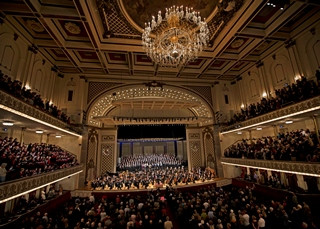|
Back
Mahler Resplendent in Cincinnati Cincinnati
Music Hall
05/17/2014 -
Gustav Mahler: Symphony No. 8 (“Symphony of a Thousand”) in E-flat Major
Erin Wall, Tracy Cox, Amanda Woodbury (sopranos), Sara Murphy, Ronnita Nicole Miller (mezzo-soprano), Rodrick Dixon (tenor), Donnie Ray Albert (baritone), Kristinn Sigmundsson (bass)
May Festival Chorus, Robert Porco (director), Nashville Symphony Chorus, Kelly Corcoran (director), Cincinnati Children’s Choir, Robyn Lana (director), Cincinnati Symphony Orchestra, James Conlon (conductor)

Music Hall, Cincinnati (© Philip Groshong)
There is really nothing like the Cincinnati May Festival. At 141, it is the oldest continuing choral festival in the Western Hemisphere. Born out of the city’s German-inspired saengerfest tradition, it is laden with color and ceremony. Herald trumpeters summon the audience before each concert, tiny flower girls present bouquets to the artists, and there are flowers everywhere. Music Hall in the city’s Over-the-Rhine neighborhood was built for the May Festival in 1878.
Following this year’s opening night, May 7 at Music Hall, the festival included a May 9 “run out” to New York for the “Spring for Music” Festival at Carnegie Hall. Both concerts included a rare performance of Canadian-born African-American R. Nathaniel Dett’s oratorio The Ordering of Moses (premiered at the 1937 May Festival).
Back in Cincinnati, music director James Conlon applied his flair for programming by pairing Beethoven’s Ninth Symphony with the “Ode to Joy” Cantata by Tchaikovsky May 16 and 18 at Music Hall. Unpublished until 1960, Tchaikovsky’s 1865 work was his graduation thesis from the St. Petersburg Conservatory. Final program of the 2014 festival comprised Mahler’s Symphony No. 8 May 17 at Music Hall.
With 3,516 seats and prized acoustics, Music Hall makes an ideal venue for Mahler’s so-called “Symphony of a Thousand.” For this performance, the participants totaled 496 by official count, with the May Festival Chorus, Nashville Symphony Chorus, Cincinnati Children’s Choir, Cincinnati Symphony Orchestra, eight soloists and an offstage brass choir.
The organ’s fortissimo E-flat-major chord and the invocation by the double chorus of “Veni, veni, creator spiritus,” echoed by the brass, opened part one of the two-part symphony, a setting of the ninth-century hymn Veni Creator Spiritus. The choruses’ jubilant spirit set the tone for the giant motet, which reached into every corner of the hall. Their pointed declamation underscored the polyphonic richness of the music (Mahler was reportedly inspired by Bach in its creation). The 80-voice Children’s Choir led the way into the final “Gloria Patri Domino,” its verses gathering momentum to a shattering end by the full company, including seven soloists, the 100-plus CSO and a seven-piece offstage brass choir.
Part two of the symphony, which Mahler devoted to the final scene of Goethe’s Faust, began softly and mysteriously. Conlon set the scene beautifully, with tremolo violins and pizzicato in the lower strings against a countermelody by the woodwinds, given ardent restatement by the cellos. The vocal soloists, placed on a raised platform between the CSO and the combined chorus, made distinguished contributions to the drama (Faust’s soul being conveyed to heaven). Baritone Donnie Ray Albert led off as Pater Ecstaticus, followed by bass Kristinn Sigmundsson as Pater Profundis, both introducing the overarching theme of eternal love.
The women’s voices intoned the welcoming angels and the children’s voices the blessed children. Tenor Rodrick Dixon could not be heard well at first as Doctor Marianus, but soared as the texture thinned. Soprano Erin Wall as Magna Peccatrix and mezzo-sopranos Sara Murphy and Ronnita Nicole Miller as Mulier Samaritana and Maria Aegyptiaca, respectively, added their supplications for Faust’s soul, as did soprano Tracy Cox as Gretchen. Second violinist Paul Patterson set his fiddle aside for a mandolin at one point, making an engaging contribution to the dialogues.
Mary Ellyn Hutton
|